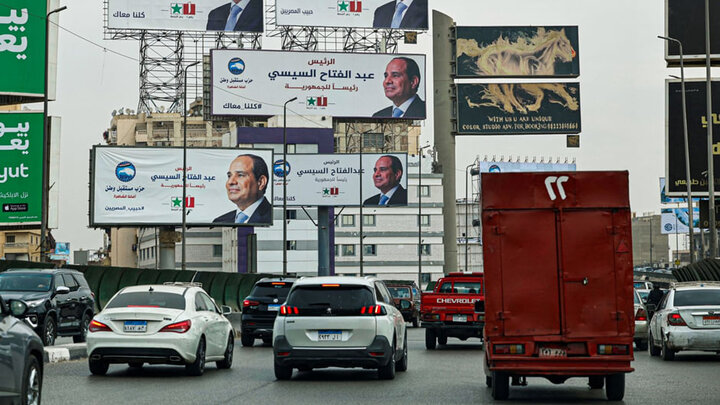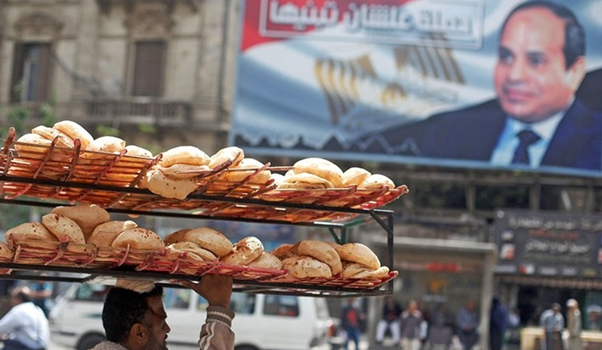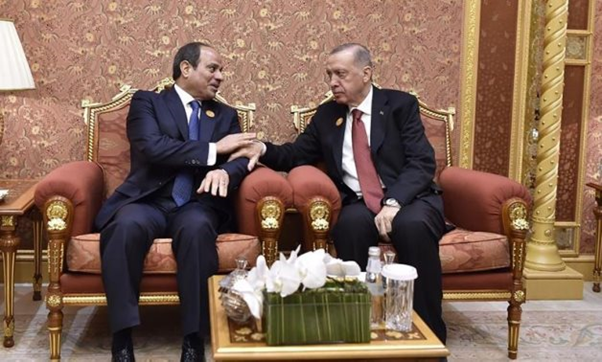developments in Egypt; From the presidential election to the economic crisis

| Despite the re-victory of Sisi in the recent elections, the Arab-African country of Egypt faced numerous economic, political and security problems in 1402. |
Mehr News Agency, Intergroup International: The Arab-African country of Egypt went through difficult conditions in 1402. In addition to the important event of the presidential election, this country witnessed an increase in inflation and a deepening of the economic crisis, and the livelihood of millions of Egypt’s 114 million citizens was in trouble.
In the elections of December 1402, Abdul Fattah al-Sisi, who has been in power since 2014, won nearly 40 million votes, i.e. 89.6% of the total votes. country, to be elected as the president for the third consecutive term. With the difference that this time, he is supposed to hold this position for a period of 6 years.
The other three candidates of the Egyptian elections, in total, won only 10% of the people’s votes, and the Egyptian people, with a participation of 66.1%, still went to the polls in favor of El-Sisi. They voted. The head of the National Election Organization of Egypt announced that the elections of December 1402 in Egypt witnessed the highest voter turnout in the history of this country.
Egypt and the economic crisis
With El-Sisi’s decisive victory in the election campaign, Egypt could not overcome the economic crisis in 1402.
Middle East and Africa analysts believe that Egypt, as one of the important countries with a geopolitical position in North Africa, is facing several important crises; including the ever-increasing food inflation and the mismatch between the country’s incomes and expenses.
Egypt’s economic situation in 1402 was also critical, and according to official statistics, the Egyptian economy generated more than 400 billion dollars in foreign and domestic debt, and Egypt’s economic indicators It is in unstable and unfavorable conditions.
During the last year, the value of Egypt’s national currency has decreased by more than 50% and the critical state of Egypt’s economy has caused some of the wealthy governments in the region, such as the United Arab Emirates and Saudi Arabia should seek to buy government properties and assets in Egypt, and in addition, issues such as the possibility of selling tourist islands to compensate for the deficit of foreign exchange resources have caused negative reactions among the Egyptian elites. It is said that more than 60% of Egypt’s economy is in the hands of the military, and although there were no mass protests in the streets of Cairo in 1402, Egyptian experts are worried that the situation in this country will worsen from what it is. Especially in a situation where, due to the tensions in the Red Sea, the amount of commercial ships passing through the Suez Canal has decreased and Egypt has lost 50% of the income from this strategic crossing of the world.
In parallel with the economic problems and the concern of the Egyptian authorities regarding large foreign debts, in the field of foreign policy and geopolitics of the region, there are also problems such as insecurity in Libya, Sudan and water tension with In 1402, Ethiopia took part of the energy of the Egyptian authorities.
Al-Sisi’s attitude towards the Palestinian issue
Egypt’s geographical conditions and the geopolitical importance of the Rafah Gate made this country, more than other countries in the region, be affected by the events after the Al-Aqsa storm operation.
dir=”RTL” style=”text-align:justify”>
From October 15, 1402 onwards, once again, the attention of many observers of international issues was directed to the issue of how the Al-Sisi government The issue of Gaza will be faced. Because the war between Hamas and the Zionist regime created new conditions in the region and the world, and in the meantime, Egypt, as a close neighbor, faced new concerns.
A look at the political positions of Cairo authorities in 1402 shows that Abdel Fattah al-Sisi, like the previous presidents of Egypt, sought to create a balance between Israel and Palestine. Is. Of course, it goes without saying that the cooperation between Egypt and the Zionist regime is at a high level, and with the mediation of the Europeans, the cooperation between Egypt and the regime in the field of energy and converting and transferring gas to liquid form has become one of the important motivations for the political closeness of Cairo and Israel. The Egyptians themselves do not have a problem or opposition with this issue, that this Arab government is a close partner of Israel on the one hand, and on the other hand, they have extensive cooperation in the field of military and intelligence issues.
Although Israel has carried out drone attacks against armed groups in North Sinai, Egypt, there is no sign of serious inconsistency or disagreement. But in any case, in an effort to maintain the balance, Egypt has also taken measures to help the Palestinian people in some cases, in a limited and relative manner.
The government of Cairo was able to use the advantage of its geographical location, despite the protests of the Zionists, to pass nearly 1,200 trucks through the Rafah border crossing towards Gaza, but the United Nations He announced that the amount of aid should be increased, and many regional officials also asked Egypt to make more efforts in this matter. Although most of the negotiations related to the exchange of prisoners between Israel and Hamas were carried out by Qatari diplomats, Egypt also took effective measures in this regard.
Egypt and the critical situation in Gaza
One of the most important concerns of the Cairo government is that Palestinian immigrants from Gaza enter Egypt. Apparently, such a situation, in addition to significant economic pressure, also creates new security concerns for the al-Sisi government. For this reason, the Al-Sisi government in 1402, while monitoring the events in Gaza, was extremely concerned about the issue of refugees and asylum seekers, and more border fortifications and equipment were considered to reduce the possibility of Palestinians entering Egypt to zero.
Israeli Prime Minister Benjamin Netanyahu suggested that a large number of Palestinian refugees leave Gaza and settle in Sinai with the coordination of Al-Sisi’s government, but Al-Sisi obviously refused this. He rejected the insidious request because, from his point of view, the residence of Palestinians in Sinai can give the Israeli Air Force a permanent excuse to attack this region and endanger Egypt’s security and ignore the country’s national sovereignty.
Normalization of relations between Cairo – Ankara
One of the most important diplomatic events related to Egypt in 1402 was the normalization of relations between Egypt and Turkey, Recep Tayyip Erdogan’s visit to Cairo.
Given Turkey’s clear support for Mohamed Morsi and the movement of the Muslim Brotherhood during the so-called “Arab Spring” and Erdogan’s opposition to El-Sisi, a serious challenge in relations between Ankara And Cairo had been created, but in February 1402, Erdogan, in a clear and pragmatic turn, agreed to visit Egypt once again after 12 years.




